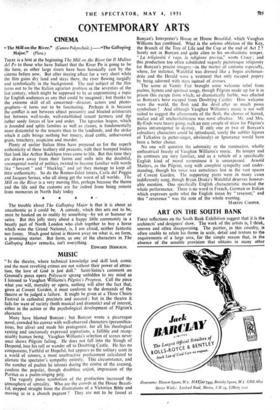CONTEMPORARY ARTS
CINEMA
"The Mill on the River." (Cameo-Polytechnic.)—“The Galloping Major." (Plaza.) THERE is a hint at the beginning The Mill on the River (or ii Mulino del Po to those who have Italian) that the River Po is going to be the hero, as other large rivers have been heroically cast by the cinema before now. But after staying afloat for a very short while the film gains dry land and stays there, the river flowing turgidly and symbolically in the background. The real subject of the film turns out to be the Italian agrarian problem in the seventies of the last century, which might be supposed to be as unpromising a topic for English audiences as any that could be imagined ; but thanks to the extreme skill of all concerned—director, actors and photo- graphers—it turns out to be fascinating. Perhaps it is, because the conflict is not between abject peasantry and bloated aristocrats but between well-to-do, well-established tenant farmers and the rather seedy forces of law and order. The agrarian league, which is founded and splits families as well as classes, is fundamentally more distasteful to the tenants than to the landlords, and the strike which it calls brings nothing but misery, dead cattle, unharvested grain, treachery, suspicion and murder. Plenty of earlier Italian films have prepared us for the superb authenticity of these leathery old peasants, with their humped bodies that look like Arthur Rackham trees come to life. But this time they are drawn away from their farms and mills into the doubtful, uncongenial world of politics, twisted to become familiar with words like " boycott " and " blackleg," and yet they manage to keep all thtir authenticity. So do the Romeo-Juliet lovers, Carla del Poggio and Jacques Sernas, who all along get the worst of all worlds. The Mill on the River is a very moving film, perhaps because the theme and the life and the customs are far indeed from being remote from memories in North Italy today
* * ** —
The trouble about The Galloping Major is that it is about as unauthentic as it could be. A comedy, which this sets out to be, must be hooked on to reality by something—by wit or humour or satire. But this jolly story about a happy little community in a beastly part of North London who club together to buy a horse which wins the Grand National, is, I am afraid, neither fantastic nor funny. Much good talent is thrown away on what is, on form, a promising starter. But form, as one of the characters in The Galloping Major remarks, isn't everything. EDWARD HODGKIN.


































 Previous page
Previous page